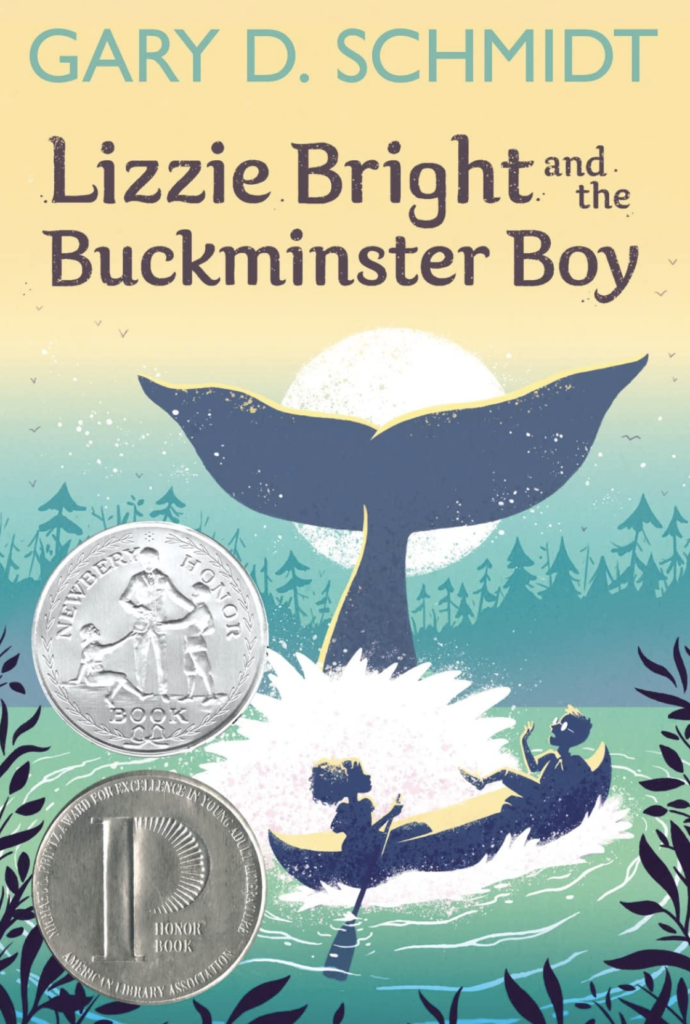It is hard to review this book in a way that doesn’t spoil the ending but still gives you a sense of why this is so compelling. Because this is a work of historical fiction, I am tempted to tell you about the facts that inspired this tragic tale. I think, however, that I will let you decide for yourself what you wish to know before reading. The setting of this story is real. The characters are semi-real. The large events are mostly real and the small ones are added to draw us in and make us care. In some ways this is one of Schmidt’s gentler tales, but in other ways it is the hardest. I am glad to have read this. I will recommend this to teens and moms. I will probably do a book club on this one. And I will sob each time I do.
Diane and I love Gary D. Schmidt’s middle school stories. He has a heart for boys who are coming of age, and he tells their stories so creatively. In each story we meet an ordinary kid with normal struggles that are amplified by the realities of real-world problems. Typically, the boy has a difficult home life or has endured some tragedy. Sometimes the story is about a girl, but usually Schmidt centers the story around a boy. In each story the main character encounters at least one interested adult who serves as a mentor for that kid. In each of those situations, the adult is uniquely able to recognize and draw out some kind of special genius or talent in our main character. Lizzie Bright and the Buckminster Boy is not unlike the others.

The title characters of this story are Lizzie Bright, a black American girl who lives with her grandfather on Malaga island, and Turner Buckminster, the son of a New England minister. Their friendship causes scandal and an awakening throughout the town. But, it ends in so much tragedy. This story is not hard, until it is. And once it is, it never gets much better. And it is all the worse because it is true. But, it is told well and is an excellent story to have in our hearts.
The story opens on a sunny day in 1912, the Buckminster family’s first day in their new pastoral assignment in Phippsburg, Massachusetts. Turner is miserable already, and all he can think about is heading West for the territories. In this new town, the boys play baseball differently and they waste no opportunity to harass and alienate Buckminster. The pressure on the minister’s son is double because, not only is he the new kid, but he is also a minister’s son and must behave above reproach in all things. Miserable and alone, Buckminster wanders down the shoreline where he meets an unlikely friend.
In others of his books, Gary D. Schmidt uses things like Shakespeare, the Labors of Hercules, and Audubon to reveal the genius of the main character. Always written with the slang and expressions common to the character being drawn, those stories read like modern fiction. In this one, however, the historical setting demands refined speech and manners for our hero. And so this story is elegant and reads more like The Witch of Blackbird Pond or Johnny Tremain than The Wednesday Wars or The Labors of Hercules Beal. Also, it moves at a pace more like those novels than Schmidt’s other fare. Instead of following the school year pattern common to his other books, most of the action happens between summer and early winter.
Turner and his father have a challenging relationship. In short, Turner is just not the son that Reverend Buckminster had hoped for. And, no matter what he does or doesn’t do, Turner ends up humiliating his father in front of the highly judgmental congregation. But, Schmidt doesn’t leave the relationship there. Mercifully, the father and son learn to understand each other a little bit better, and that is a gift Turner will need when the tragedies begin.
Truly, if I had not known that Gary D. Schmidt was the author of this book, I do not know if I could have guessed it. This one shows Schmidt’s impressive range. While it does have a slow start (I didn’t start to care about this book until the whale), once it gets going, it is very compelling. It is likely to please Schmidt fans and maybe readers who don’t normally gravitate toward his books.
For parents who wish to know the true historic setting of this book and more about why Schmidt chose to write it, you may wish to take a look at this article.
3 Comments
Comments are closed.